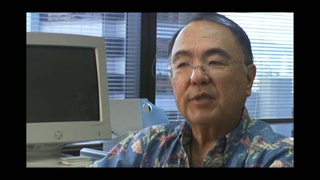Interviews
Japanese were not welcomed back to Salinas
Politically speaking, Salinas was also taken over by the people from Oklahoma, the Dustbowl people from Oklahoma who took over the farming and supervisory position in Salinas, and of course politically speaking they didn’t want the Japanese to come back because it was competition. And as a result, Salinas has been for a long time did not want the Japanese to return.
As a matter of fact, my father’s company wrote a letter to him telling him that we employees of the Salinas Valley Vegetable Exchange—that’s the name of the company my father owned—that he would not return to Salinas. And as a result we did not go back to Salinas. So that’s the reason why we relocated to Los Gatos.
Date: March 22, 2018
Location: California, US
Interviewer: John Esaki
Contributed by: Watase Media Arts Center, Japanese American National Museum
Explore More Videos

Thoughts on the post-9/11 atmosphere in the U.S.
(1930-2018) Nisei born in Peru. Taken to the United States during WWII.

Dealing with racism within army unit in Korea
(b. 1939) Japanese American painter, printmaker & professor

Making the decision to resist the draft
(b. 1923) Nisei from Washington. Resisted draft during WWII.

Difficulty getting work during World War II
(b. 1921) Nisei businessman. Established "Made in Oregon" retail stores


Stereotypes about Japanese: past and present (Spanish)
(b. 1937) Professional journalist

World War II hysteria against Japanese in New York City
(1924-2018) Researcher, Activist




Positive experiences with Asian Americans for Action
(1924-2018) Researcher, Activist

Being an American soldier and an "enemy alien"
(1923-2011) Lawyer, MIS veteran, founder of Francis and Sarah Sogi Foundation

Not relating to Japan Americans' experiences on the mainland
(1923-2011) Lawyer, MIS veteran, founder of Francis and Sarah Sogi Foundation


Father interrogated by FBI, but not taken away
(1925 - 2018) Nisei educator from Hawai‘i
